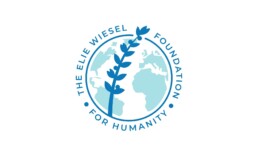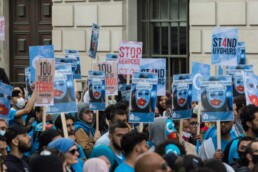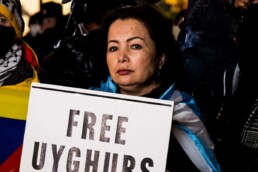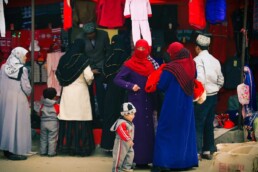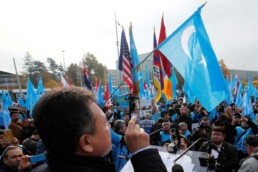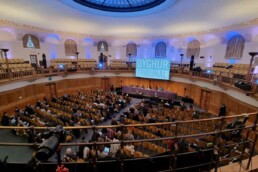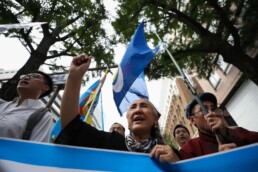Elie Wiesel Foundation grants support to Uyghur Activists
Elie Wiesel Foundation stands against Uyghur persecution, grants support activism. Interfaith fellowship fosters unity and fights prejudice.
The Elie Wiesel Foundation, named in honor of Holocaust survivor and human rights advocate Elie Wiesel, has allocated grants totaling £420,000 to support organizations championing the cause of the persecuted Uyghur Muslim minority in China. This philanthropic initiative aims to raise awareness about the ongoing Uyghur genocide, coordinate global responses, energize activism, and explore innovative ways to engage conscientious individuals. In addition to supporting Uyghur advocacy, the Foundation is fostering an interfaith fellowship between Black and Jewish college students, promoting unity and understanding amidst the challenges of racism and antisemitism.
Uyghur Advocacy and Awareness
The World Uyghur Congress (WUC) and the Uyghur Human Rights Project (UHRP) are among the organizations receiving grants from the Elie Wiesel Foundation. These groups, along with Jewish World Watch (JWW), will host a Conference of Uyghur activists and allies in New York, seeking to mobilize international support, galvanize activism, and facilitate collaboration among stakeholders. By shedding light on the grave human rights abuses and mass internment of Uyghur Muslims in China, this event aims to rally global action against the atrocities being committed.
Ana Care’s Cultural Preservation Efforts
Ana Care, another recipient of the Foundation’s grant, is dedicated to preserving the Uyghur people’s language, history, and culture. Through interactive programming for schools, communities, and Uyghur families in the diaspora, Ana Care aims to ensure that the rich heritage of the Uyghur community endures despite the oppressive conditions they face. By supporting Ana Care, the Elie Wiesel Foundation acknowledges the importance of safeguarding cultural identities and empowering communities impacted by persecution.
Natan Sharansky’s Perspective
Renowned Jewish human rights activist Natan Sharansky, a member of the grant selection panel, emphasizes the urgency and severity of the Uyghur persecution. Comparing the situation to concentration camps, Sharansky denounces the Chinese regime’s inhumane treatment of Uyghur Muslims, deeming it one of the most significant human rights violations of our time. He also expresses concern about the insufficient response from the international community and calls for a stronger collective effort to address this grave injustice.
The Fellowship Promoting Unity
In addition to supporting Uyghur advocacy, the Elie Wiesel Foundation is fostering an interfaith fellowship between Black and Jewish college students. In collaboration with Gratz College and the United Negro College Fund (UNCF), this one-year fellowship aims to connect the two groups by exploring landmarks of significance to each culture while building common experiences and fostering mutual support. By bringing together these communities affected by racism and antisemitism, the Foundation promotes understanding, empathy, and unity, while paving the way for future collaboration in combating prejudice.
The Elie Wiesel Foundation’s grants and initiatives exemplify the power of effective philanthropy in addressing pressing human rights concerns and fostering unity amidst prejudice. By supporting Uyghur advocacy organizations, the Foundation contributes to the international effort against the ongoing Uyghur genocide. Simultaneously, their interfaith fellowship program bridges the gap between Black and Jewish college students, strengthening solidarity and mutual support in the face of racism and antisemitism. Through the legacy of Elie Wiesel, the Foundation sends a clear message: we must stand together and invest in combating prejudice, regardless of our backgrounds, for a more inclusive and compassionate world.
Elie Wiesel Foundation announces first round of grants, aimed to help Uyghur crisis
Elisha Wiesel, son of Holocaust survivor and Nobel Peace Prize laureate Elie Wiesel, who heads foundation in his father’s name, explains why he’s devoted himself to genocides half a world away from Auschwitz
How can Americans urge political leaders to do more to oppose the Chinese government’s genocide of ethnic Uyghurs?
That’s been among the central concerns of the Elie Wiesel Foundation for Humanity since it launched a grant-making program in October 2022.
On Monday, the foundation, which was founded in 1986, announced the first beneficiaries of its inaugural grant-making cycle, selected based on their commitment to advocating for the Uyghur community. The grantees in Uyghur advocacy include World Uyghur Congress, Uyghur Human Rights Project, World Jewish Watch ($250,000) and Ana Care & Education ($50,000).
The grant advisory committee included Mark Hetfield, president and CEO of HIAS; Nadine Epstein, editor-in-chief and CEO of Moment magazine; Gulhumar Haitiwaji, activist and daughter of camp survivor Gulbahar Haitiwaj; and Natan Sharansky, Soviet dissident, Israeli politician and human rights activist.
Sharansky explained why Uyghur advocacy is an appropriate choice for the inaugural grants of the Elie Wiesel Foundation.
“[The] Chinese regime de facto keeps the Uyghur people in concentration camps, treating them in the most inhuman way,” Sharanksy said in a statement. “It’s probably the most massive violation of human rights in our time, while the Free World’s response is disproportionately weak to the scope of this crime.”
The U.S. State Department estimates more than 1 million civilians have been arbitrarily imprisoned in the Xinjiang province since at least 2017 while China is committing crimes against humanity against Muslim Uyghurs in an effort to create a single-ethnic state. The State Department describes the crimes as arbitrary imprisonment and torture, forced sterilization, forced labor and restrictions on freedom of religion and expression.
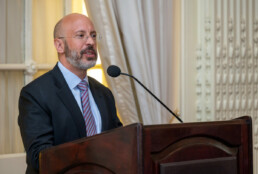
Elisha Wiesel, the chairman of the foundation and son of Holocaust survivor and Nobel Peace Prize laureate Elie Wiesel, the foundation’s namesake, spoke to eJewishPhilanthropy over email about why he’s devoted himself to crises half a world away from Auschwitz.
This interview has been lightly edited for clarity.
Haley Cohen: What was the rationale for selecting groups working on behalf of the Uyghurs?
Elisha Wiesel: The attempts by the Chinese Communist Party to erase Uyghur culture represent the largest genocide occurring on the planet today. More than a million Uyghurs are being detained for their ethnicity and faith. Reports of torture have made their way to the West through survivors who have made it out. It is hard to listen to the stories of these survivors without feeling highly motivated to act and amplify their story. Against seemingly impossible odds, my father faced the biggest bully on the planet during the Cold War — the Soviet Union — and over a 25-year period helped build the Soviet Jewry movement. I believe we honor his memory by challenging the Chinese Communist Party to end their mistreatment of the Uyghurs.
HC: With so much geopolitical tension between the U.S. and China, what leverage does the U.S. really have on this issue?
EW: Confronting the Chinese Communist Party on their mistreatment of Uyghurs is, thankfully, a bipartisan issue, enabling rare political agreement that can actually drive change. The Chinese economy is not without its difficulties and relies heavily on the U.S. consumer. Consumers are more socially conscious than ever, and there is an opportunity for major American brands to publicly declare that their supply chains are free of Uyghur forced labor.
HC: China has recently begun to focus on the Middle East and is establishing ties with Saudi Arabia and other Gulf nations. What are those nations doing to support their Muslim brethren?
EW: Sadly, the Arab League’s recent visit to China was accompanied by a press release which said, “Members of the delegation said that Xinjiang’s society is harmonious, the economy is prosperous and Muslims freely exercise their ethnic and religious rights in accordance with the law.”
HC: Is there any evidence that pressure on China by outside groups has been effective in improving their human rights practices?
EW: We can only hope that people in China will hear the messages that their government has gone too far and will one day use their influence for better treatment of the Uyghurs. As my father said in his 1986 Nobel acceptance speech, [referring to victims of human rights abuses everywhere,] “What all these victims need above all is to know that they are not alone.”
HC: What are your thoughts about the criticism in some quarters of the Jewish community for “universalizing” the lessons of the Holocaust — in other words, using those lessons to shed light on a situation like the Uyghurs?
EW: My father believed that surviving the Holocaust left him with a mission not only to testify about the genocide that occurred to the Jewish people but also to do what he could to prevent future genocides. We are capable of being morally activated in the present without trivializing or minimizing the past. The detainment and mistreatment of a peaceful population, which poses no threat to China, rightly deserves the international attention, which the Uyghur community are asking for.
Uyghur rights advocates win grants from Elie Wiesel Foundation
Those fighting for China’s persecuted Muslim minority will get a six-figure boost as Natan Sharansky says West’s response is ‘weak’
Advocates of China’s persecuted Uyghur Muslim minority are among those to have been allocated grants totalling £420,000 from a foundation set up in Holocaust survivor Elie Wiesel’s name.
Three recipient organisations – World Uyghur Congress (WUC), Uyghur Human Rights Project (UHRP), and Jewish World Watch (JWW) – will host a Conference of Uyghur activists and allies in New York this winter.
The aim of the event is to galvanise the international response to the ongoing Uyghur genocide, coordinate stakeholders, energise activism, and discuss new ways of engaging citizens of conscience.
Additional grantee Ana Care is working to preserve the Uyghur people’s language, history, and culture through interactive programming for schools, communities, and Uyghur families in the diaspora.
Russian-born Jewish human rights activist Natan Sharansky, who was part of the grant selection panel, said the Chinese regime “de facto keeps the Uyghur people in concentration camps, treating them in the most inhuman way”.
He added that their persecution was “probably the most massive violation of human rights in our time”, but that “the free world’s response is disproportionately weak to the scope of this crime”.
Dr Mehnaz Afridi, director of the Holocaust Genocide, and Interfaith Education Center at Manhattan College, said: “I am especially grateful that the Foundation has focused on restoring the dignity of the Uyghur population.
“The work of the Elie Wiesel Foundation is an example of effective philanthropy. The message is loud and clear: that we must work together by investing in all prejudice no matter who we are.”
Further monies went towards a one-year Fellowship between Black and Jewish college students, in collaboration with Gratz College and the United Negro College Fund (UNCF).
The foundation said it was “committed to jointly facing the challenges of racism and antisemitism”, adding that the Fellowship “will connect these two groups of students by visiting landmarks of importance to each culture while building on common experiences and understanding the need for mutual support”.
$550,000 Grant Boosts LA-Based Nonprofit Jewish World Watch
Jewish World Watch, a nonprofit organization based in Los Angeles that is dedicated to providing assistance and support to survivors of mass atrocities worldwide, made an exciting announcement on Monday. They have received a portion of a $550,000 grant for their groundbreaking winter conference in New York.
The Elie Wiesel Foundation for Humanity has selected JWW as one of the beneficiaries of its inaugural grant-making cycle. Launched in October 2022, the foundation seeks out and supports organizations whose work aligns with the legacy of Elie Wiesel, a renowned educator, activist, journalist, and man of faith.
Serena Oberstein, the executive director of JWW, expressed her gratitude for being among the first recipients of a grant from the Elie Wiesel Foundation. She stated, “We are honored to be recognized by the foundation and to receive their support.”
Joining JWW as grantees are the World Uyghur Congress and the Uyghur Human Rights Project. These organizations have been chosen, in part, for their advocacy on behalf of the Uyghur community. The foundation reports that since 2017, over 1.8 million Uyghurs have been forcibly separated from their families and placed in “re-education camps” in northwest China or East Turkestan.
Elisha Wiesel, the chairman of the foundation, explained, “Our inaugural activist portfolio grants are specifically aimed at supporting advocates who are diligently working to restore the rights and dignity of the Uyghur population.” He added, “Elie Wiesel’s legacy represents resilience, optimism, and the responsibility we all share to strive for a world without genocide.”
The $550,000 grant will be used to support a winter conference in New York, where Uyghur activists and allies will gather to address the international response to the Uyghur genocide. JWW officials believe that the conference will foster collaboration among various stakeholders and invigorate ongoing Uyghur activism.
Omer Kanat, the executive director of the Uyghur Human Rights Project, expressed his appreciation for the opportunity to work alongside the Elie Wiesel Foundation, Jewish World Watch, and the World Uyghur Congress. He said, “The December conference will serve as a powerful demonstration of solidarity and our unwavering commitment to the principle of ‘never again’. We will also use this platform to call for further action against the ongoing genocide.”
This significant grant and the upcoming conference highlight the dedication and collaborative efforts of organizations striving to make a lasting impact in the fight against mass atrocities and the protection of human rights.
Three Uyghur groups receive grants from Elie Wiesel Foundation
The grants aim to help shed light on China’s genocide of Uyghurs, foundation head says.
2023.07.11
The Elie Wiesel Foundation for Humanity has awarded grants amounting to hundreds of thousands of dollars to three Uyghur groups dedicated to Uyghur rights advocacy and education amid ongoing repression against the mostly Muslim ethnic group by Chinese authorities.
The Germany-based World Uyghur Congress and U.S.-based Uyghur Human Rights Project were selected as grantees for planning to host a conference of Uyghur allies and activists later this year in New York to discuss the international response to the persecution of Uyghurs, which the U.S. government and other Western parliaments have labeled a genocide.
They will hold the event along with Jewish World Watch, another grantee.
The third Uyghur organization selected as a grantee is Ana Care and Education, a nonprofit based in Virginia, in the United States, that provides programs for Uyghur families living in the diaspora to preserve their language, history and culture.
The grantees were selected “based on their commitment to advocating for the Uyghur community, who are being unlawfully detained by the Chinese government in an effort to create a single-ethnic state,” the nonprofit organization said in a statement issued on Monday.
Grants totaling US$550,000 were awarded to the activist organizations as well as to four other nonprofits for educational fellowships, though the specific amounts for each were not given.
The grant-making initiative, launched in October 2022, supports organizations whose efforts are grounded by the values of Elie Wiesel, a writer, educator, political activist and Holocaust survivor who died in 2016.
Wiesel and his wife, Marion, set up the foundation after he received the 1986 Nobel Prize for Peace.
Elisha Wiesel, Elie’s son and chairman of the foundation, told Radio Free Asia that by using the money to shed light on the Uyghur genocide, the world will learn about the crimes that are occurring in Xinjiang.
“The largest genocide on the planet is [that of the] Uyghur minority,” Elisha Wiesel said. “Right now, the Chinese government is trying to end their Muslim practices, trying to assimilate their faith, and as is in many ways trying to end their identity as a people, including the use of detainment camps.”
“We feel it is the cause that is the most severe on the planet, and yet not many people are speaking about it.”
Dolkun Isa, president of the World Uyghur Congress, said the grant is important because it will help make the world accept the genocide, gain the world’s sympathy, and make the Jewish community more aware of the Uyghur issue and act upon it.
Sureyya Kashgary, director of Ana Care & Education, said her organization received a $50,000 grant for school-based learning for students and adults that connect them to their Uyghur ancestry.
Translated by RFA Uyghur. Edited by Roseanne Gerin and Malcolm Foster.
Elie Wiesel Foundation Announces Inaugural Grantees Dedicated to Uyghur Advocacy Efforts and Education
Grants totaling $550,000 to be awarded to Organizations supporting Elie Wiesel’s Values and Mission
July 10, 2023, New York, NY – The Elie Wiesel Foundation for Humanity is pleased to announce today the first beneficiaries of its inaugural grant-making cycle. The grant-making initiative, launched in October of 2022, identifies and supports organizations whose efforts are grounded by Elie Wiesel’s values and the Foundation’s mission, and which align to portfolios reflecting Elie Wiesel’s legacy: Educator, Activist, Journalist, Student, and Man of Faith. The grant-making program takes a hybrid approach by not only supporting organizations through fiscal sponsorship but also by acting as an active thought partner to champion and elevate each organization’s cause.
This year’s Activist Portfolio Grantees were selected based on their commitment to advocating for the Uyghur community, who are being unlawfully detained by the Chinese government in an effort to create a single-ethnic state.
“Our inaugural Activist Portfolio grants are laser-focused towards advocates working purposefully and urgently towards restoring the rights and dignity of the Uyghur population”, said Elisha Wiesel, Chairman of the Foundation.
“Chinese regime de facto keeps the Uyghur people in concentration camps, treating them in the most inhuman way. It’s probably the most massive violation of human rights in our time, while the Free World’s response is disproportionately weak to the scope of this crime.” Says Natan Sharansky, renowned Human Rights Activist and member of the Foundation’s Grant Selection Committee. “That is why it is very logical and appropriate that the first grant of the Elie Wiesel Foundation is dedicated to elevating education and Uyghur advocacy efforts.”
The selected Grantees are:
- World Uyghur Congress, Uyghur Human Rights Project, and Jewish World Watch: WUC, UHRP, and JWW will host a Conference of Uyghur activists and allies to consider the international response to the Uyghur genocide. To be held this winter in New York, the Conference will aim to foster collaboration between these stakeholders, energize current efforts of Uyghur activism, and discuss new ways to activate the Jewish community and engage other citizens of conscience.
- Ana Care & Education: Ana Care aims to preserve the Uyghur language, history, and culture through interactive programming for Uyghur families in the diaspora. They provide school-based learning for students and adults that helps shape relationships, builds community, and continues to connect them to their Uyghur ancestry.
The Educator Portfolio honors Elie Wiesel’s commitment to education by supporting programs that foster dialogue connected to moral education grounded in Jewish values.
“Our inaugural Educator Portfolio grants will elevate the patient, thoughtful work being done by moral educators to bring Jewish values to life in the classroom”, said Elisha Wiesel, chairman of the Foundation.
The selected Grantees in the Educator Portfolio are:
- The Witness Institute: The idea of the Witness Institute was born from discussions between Professor Wiesel and his Boston University student, Rabbi Dr. Ariel Burger. The Foundation will partner with The Witness Institute to support this 15-month fellowship which sensitizes and equips emerging leaders with practices that develop moral courage, fusing Professor Wiesel’s teaching methods and published works to inspire moral leadership. Participants will graduate being able to influence their communities and support their missions in positive ways.
- Gratz College & United Negro College Fund: The Elie Wiesel Foundation will support a 1-year Fellowship between Black and Jewish college students. Gratz College, UNCF, and The Elie Wiesel Foundation are committed to jointly facing the challenges of racism and antisemitism. The Fellowship will connect these two groups of students by visiting landmarks of importance to each culture while building on common experiences and understanding the need for mutual support and advocacy.
- Valley Beit Midrash (VBM): VBM is a global center for learning and action. This grant will support The Elie Wiesel Social Action Fellowship, a new program that will consist of online moral education classes taught by renowned scholars/activists from around the world and putting those teachings into hands-on community volunteer projects.
The Elie Wiesel Foundation turned to a number of thought leaders in determining the most deserving recipients from the 110 applications received. The team assembled to review the top selections for the Educator Portfolio included Dr. Mehnaz Afridi, director of the Holocaust, Genocide, and Interfaith Education Center at Manhattan College, and Sarah Idan, founding CEO of Humanity Forward and Miss Iraq 2017-2018. Those selected to consider the leading selections for the Activist Portfolio included Mark Hetfield, president and CEO of HIAS, the oldest resettlement organization in the world, Nadine Epstein, Editor-in-Chief of Moment Magazine, Gulhumar Haitiwaji, daughter of Gulbahar Haitiwaji, a Uyghur woman who survived a Chinese re-education camp, and Natan Sharansky, renowned human rights activist.
Director of the Holocaust Genocide, and Interfaith Education Center at Manhattan College and member of the Foundation’s Grant Selection Committee, Dr. Mehnaz Afridi said: “It is an honor to be part of the team of evaluators and learn about the exceptional work being done around the world for justice, advocacy, and peacebuilding. I am especially grateful that the Foundation has focused on restoring the dignity of the Uyghur population. The work of the Elie Wiesel Foundation is an example of effective philanthropy, the message is loud and clear that we must work together by investing in all prejudice no matter who we are.”
The Elie Wiesel Foundation appreciates the many applicants who took the time and energy to engage with us and intends to open future grant cycles.
+++
About The Elie Wiesel Foundation for Humanity
Elie Wiesel and his wife, Marion, established The Elie Wiesel Foundation soon after he was awarded the 1986 Nobel Prize for Peace. Now led by Marion and Elie’s son Elisha Wiesel, the Foundation seeks to spark ethical consciousness of human rights by investing in programs that promote moral leadership and real-world outcomes for victims of injustice, and by making Elie’s teachings accessible via a central online archive. To learn more, visit: https://eliewieselfoundation.org/
Media Contact
Melissa Stavenhagen
[email protected]
LA-Based Nonprofit Jewish World Watch Benefits From $550,000 Grant
Jewish World Watch, the Los Angeles-based nonprofit committed to bringing help and healing to survivors of mass atrocities across the globe, announced Monday it received a share of a $550,000 grant for its landmark winter conference in New York.
The Elie Wiesel Foundation for Humanity awarded JWW as one of its first beneficiaries of its inaugural grant-making cycle. Launched in October 2022, the foundation identifies and supports organizations whose efforts are grounded by Elie Wiesel’s legacy as an educator, activist, journalist and a man of faith.
“We are honored to be among the first organizations to receive a grant from the Elie Wiesel Foundation,” Serena Oberstein, executive director of JWW, said in a statement.
JWW is joined by World Uyghur Congress and Uyghur Human Rights Project as grantees, selected in-part for their advocacy of and for the Uyghur community. At least 1.8 million Uyghurs have been separated from their families and forced into “re-education camps” since 2017 in northwest China or East Turkestan, according to the foundation.
“Our inaugural activist portfolio grants are laser-focused toward advocates working purposefully and urgently toward restoring the rights and dignity of the Uyghur population,” Elisha Wiesel, chairman of the foundation, said in a statement.
“For those of us working at the intersection of Judaism and activism, Elie Wisel’s legacy represents perseverance, hope and the obligation each of us has to work for a world free of genocide.”
The $550,000 grant will support the trio’s winter conference of Uyghur activists and allies in New York to address the international response of Uyghur genocide.
JWW officials said the conference is intended to build collaboration among stakeholders and energize current efforts of Uyghur activism.
“The opportunity to work alongside our valued allies at the Eli Wiesel Foundation and in collaboration with Jewish World Watch and World Uyghur Congress is of enormous value,” Omer Kanat, executive director of the Uyghur Human Rights Project, said in a statement.
“The conference in December will be a chance to demonstrate a commitment to upholding the vow of `never again’ in solidarity, and to call for further action to stop ongoing genocide.”
Elie Wiesel Foundation Announces Inaugural Grantees Dedicated to Uyghur Advocacy Efforts and Education
Grants totaling $550,000 to be awarded to Organizations supporting Elie Wiesel’s Values and Mission
This year’s Activist Portfolio Grantees were selected based on their commitment to advocating for the Uyghur community, who are being unlawfully detained by the Chinese government in an effort to create a single-ethnic state.
“Our inaugural Activist Portfolio grants are laser-focused towards advocates working purposefully and urgently towards restoring the rights and dignity of the Uyghur population”, said Elisha Wiesel, Chairman of the Foundation.
“Chinese regime de facto keeps the Uyghur people in concentration camps, treating them in the most inhuman way. It’s probably the most massive violation of human rights in our time, while the Free World’s response is disproportionately weak to the scope of this crime.” Says Natan Sharansky, renowned Human Rights Activist and member of the Foundation’s Grant Selection Committee. “That is why it is very logical and appropriate that the first grant of the Elie Wiesel Foundation is dedicated to elevating education and Uyghur advocacy efforts.”
The selected Grantees are:
- World Uyghur Congress, Uyghur Human Rights Project, and Jewish World Watch: WUC, UHRP, and JWW will host a Conference of Uyghur activists and allies to consider the international response to the Uyghur genocide. To be held this winter in New York, the Conference will aim to foster collaboration between these stakeholders, energize current efforts of Uyghur activism, and discuss new ways to activate the Jewish community and engage other citizens of conscience.
- Ana Care & Education: Ana Care aims to preserve the Uyghur language, history, and culture through interactive programming for Uyghur families in the diaspora. They provide school-based learning for students and adults that helps shape relationships, builds community, and continues to connect them to their Uyghur ancestry.
The Educator Portfolio honors Elie Wiesel’s commitment to education by supporting programs that foster dialogue connected to moral education grounded in Jewish values.
“Our inaugural Educator Portfolio grants will elevate the patient, thoughtful work being done by moral educators to bring Jewish values to life in the classroom”, said Elisha Wiesel, chairman of the Foundation.”
The selected Grantees in the Educator Portfolio are:
- The Witness Institute: The idea of the Witness Institute was born from discussions between Professor Wiesel and his Boston University student, Rabbi Dr. Ariel Burger. The Foundation will partner with The Witness Institute to support this 15-month fellowship which sensitizes and equips emerging leaders with practices that develop moral courage, fusing Professor Wiesel’s teaching methods and published works to inspire moral leadership. Participants will graduate being able to influence their communities and support their missions in positive ways.
- Gratz College & United Negro College Fund: The Elie Wiesel Foundation will support a 1-year Fellowship between Black and Jewish college students. Gratz College, UNCF, and The Elie Wiesel Foundation are committed to jointly facing the challenges of racism and antisemitism. The Fellowship will connect these two groups of students by visiting landmarks of importance to each culture while building on common experiences and understanding the need for mutual support and advocacy.
- Valley Beit Midrash (VBM): VBM is a global center for learning and action. This grant will support The Elie Wiesel Social Action Fellowship, a new program that will consist of online moral education classes taught by renowned scholars/activists from around the world and putting those teachings into hands-on community volunteer projects.
The Elie Wiesel Foundation turned to a number of thought leaders in determining the most deserving recipients from the 110 applications received. The team assembled to review the top selections for the Educator Portfolio included Dr. Mehnaz Afridi, director of the Holocaust, Genocide, and Interfaith Education Center at Manhattan College, and Sarah Idan, founding CEO of Humanity Forward and Miss Iraq 2017-2018. Those selected to consider the leading selections for the Activist Portfolio included Mark Hetfield, president and CEO of HIAS, the oldest resettlement organization in the world, Nadine Epstein, Editor-in-Chief of Moment Magazine, Gulhumar Haitiwaji, daughter of Gulbahar Haitiwaji, a Uyghur woman who survived a Chinese re-education camp, and Natan Sharansky, renowned human rights activist.
Director of the Holocaust Genocide, and Interfaith Education Center at Manhattan College and member of the Foundation’s Grant Selection Committee, Dr. Mehnaz Afridi said: “It is an honor to be part of the team of evaluators and learn about the exceptional work being done around the world for justice, advocacy, and peacebuilding. I am especially grateful that the Foundation has focused on restoring the dignity of the Uyghur population. The work of the Elie Wiesel Foundation is an example of effective philanthropy, the message is loud and clear that we must work together by investing in all prejudice no matter who we are.”
The Elie Wiesel Foundation appreciates the many applicants who took the time and energy to engage with us and intends to open future grant cycles.
About The Elie Wiesel Foundation for Humanity
Elie Wiesel and his wife, Marion, established The Elie Wiesel Foundation soon after he was awarded the 1986 Nobel Prize for Peace. Now led by Marion and Elie’s son Elisha Wiesel, the Foundation seeks to spark ethical consciousness of human rights by investing in programs that promote moral leadership and real-world outcomes for victims of injustice, and by making Elie’s teachings accessible via a central online archive. To learn more, visit: https://eliewieselfoundation.org/
Media Contact
Melissa Stavenhagen
[email protected]
Amid Uyghur Crisis, Elie Wiesel Foundation Announces New Program to Advance Human Rights
When Elisha Wiesel, son of Nobel laureate Elie Wiesel, addressed the United Nations over video on International Holocaust Remembrance Day, he reminded the world’s largest diplomatic body of three anniversaries that coincided with his speech.
The Jan. 27, 2022, address came just one day before the anniversary of the death of Elisha Wiesel’s grandfather, a major event in Elie Wiesel’s novel Night. The address also came on the anniversary of the liberation of Auschwitz of by Soviet troops.
While Wiesel used the address to call attention to both events, he also used his moment on the international stage to bring awareness to a contemporary plight: the genocide of Uyghur Muslims in China. The timing was central, with the Winter Olympics set to begin in Beijing in just one week.
Wiesel closed his address by urging the UN to invoke the genocide obligations convention and launch an investigation into China’s practices toward the Uyghurs, a Muslim minority in the Xinjiang Province of northeast China that has allegedly been subjected to a range of atrocities. The United States has declared the crisis a genocide in January 2021.
“My father firmly believed that his faith required him to fight hatred and oppression everywhere, in places like Cambodia, Darfur, Rwanda, and Bosnia. Are we brave enough to follow?” Wiesel asked in the speech. “China, which sits on the Human Rights Council, inflicts mass internment, forced labor and forced sterilization on the Uyghur people.”
“I have met with Uyghur dissidents, and I believe their testimony. Will we pretend nothing is wrong?” Wiesel continued.
The Elie Wiesel Foundation has sought to support human rights in Xingang and in regions around the world—from Myanmar to Afghanistan to Sudan—in which people are suffering, according to Elisha Wiesel.
The Foundation announced in October a new initiative to advance human rights around the world that it says will help it to invest further in this mission. Under this new strategy, the organization will partner with innovative human rights organizations and act as a “megaphone to champion their cause[s],” according to the foundation.
The Foundation will also continue to issue grants to organizations that “embody Nobel Peace Prize winner Elie Wiesel’s legacy as an educator and activist,” according to a press release from the organization. Many of the Foundation’s activist grants will focus on programs that support the rights of Uyghurs in Xingjian.
“The values my father stood for–combatting indifference, educating youth, calling out injustice, and defending human rights–continue to be the moral bedrock of the Elie Wiesel Foundation,” said Elisha Wiesel in a press release. “We are so excited to announce our new grantmaking program to provide nonprofits that embody those values with the resources to achieve lasting impactful change.
These grants, the Foundation said, will range from $50,000 to $200,000. Applicants must be nonprofit organizations that can demonstrate realistic plans for carrying out campaigns to bolster human rights around the world.
To support this new initiative, the Elie Wiesel Foundation announced the creation of two new advisory boards, which will focus on the Uyghur crisis and on moral education, respectively.
The Uyghur Crisis advisory board will include Natan Sharansky, a human rights activist and lawyer who spent nine years in a Soviet prison as a refusenik in the 1970s and 1980s. Sharansky served as deputy prime minister of Israel and has received both the Congressional Gold Medal and the Presidential Medal of Freedom.
The Uyghur Crisis advisory board also includes Mark Hetfield, president and CEO of HIAS, and Gulhumar Haitiwaji, the daughter of a Uyghur woman who survived a reeducation camp.
Mayim Bialik, neuroscientist, “Big Bang Theory” actress, “Jeopardy!” host and mental health advocate, will join the moral education advisory board. Bialik is joined by Dr. Mehnaz Afridi, professor of religious studies and director of the Holocaust, Genocide, and Interfaith Education Center at Manhattan College, and Sarah Idan, former Miss Iraq and CEO of Humanity Forward.
Elie Wiesel established the eponymous foundation in 1986 after winning the Nobel Prize. Under his leadership, it funded several humanitarian programs in Israel, including the Beit Tzipora Centers and the Darfurian Refugee Program.
Elie Wiesel Foundation Launches New Approach for Advancing Human Rights
NEW YORK — The Elie Wiesel Foundation for Humanity is launching a new impact-driven philanthropic strategy to advance human rights around the world.
The Foundation, led by Elisha and Marion Wiesel, will adopt a hybrid approach that will not only grant funds but also work with organizations directly as partners, offering access to innovative thinking partners and acting as an emblematic megaphone to champion their cause.
The Foundation’s recalibrated grant-making program will seek to fund organizations that embody Nobel Peace Prize winner Elie Wiesel’s legacy as an educator and activist. Grants to educators will support moral educational programs inspired by Jewish values. The Foundation is seeking to support programs and projects that foster dialogue, especially in engaging ways.
Activist grants, meanwhile, will focus on programs that restore the rights and dignity of the Uyghur population, in keeping with Elie Wiesel’s belief that “sometimes we must interfere. When human lives are endangered, when human dignity is in jeopardy, national borders and sensitives become irrelevant. Whenever men or women are persecuted because of their race, religion, or political views, that place must become the center of the universe.”
The Foundation will be awarding one or more grants in each portfolio for its 2022 cycle, ranging in size from $50,000 to $200,000. Applicants must be financially sound 501(c)(3) tax-exempt organizations, able to demonstrate realistic plans for carrying out the program or project for which they seek funding. Submissions will be reviewed internally through various stages and finalists will be considered by a group of notable names, passionate about the respective value track. Grant applications are being accepted online through the Foundation’s website and are due Dec. 31, 2022.
“The values my father stood for — combatting indifference, educating youth, calling out injustice, and defending human rights — continue to be the moral bedrock of the Elie Wiesel Foundation,” said Elisha Wiesel. “We are so excited to announce our new grant-making program to provide nonprofits that embody those values with the resources to achieve lasting impactful change.”
“Elie Wiesel was my dear friend and trusted partner in the fight for human rights around the world. I think it is very appropriate that his Foundation put the fate of the Uyghur people as one of its main priorities and will be focused on delivering resources and moral support to those advocating for the Uyghurs,” said human rights activist and EWF Advisory Board member Natan Sharanksy. “The free world cannot stay silent about China’s horrific persecution of its Uyghur minority. I know firsthand the power of outside support to those standing bravely against totalitarian regimes. That is why I am glad to serve as an Advisory Board member at the Elie Wiesel Foundation, dealing with this issue.”
The advisory board on uyghur crisis to include:
• Natan Sharansky is a human rights activist and author who spent nine years in Soviet prisons as a refusenik during the 1970s and 1980s. From 1996-2005 Sharansky served as minister as well as deputy prime minister, in four successive Israeli governments. Sharansky served as chairman of the Jewish Agency for Israel from 2009-2018. He was awarded the Congressional Gold Medal in 1986 and the Presidential Medal of Freedom in 2006.
• Mark Hetfield is the president and CEO of HIAS, the oldest resettlement organization in the world.
• Gulhumar Haitiwaji is the daughter of a Uyghur woman who survived a Chinese re-education camp.
The advisory board on moral education to include:
• Mayim Bialik is a neuroscientist, an actress, a podcast host, an author, and an outspoken activist for mental health and Jewish causes.
• Dr. Mehnaz Afridi is a professor of Religious studies and the director of the Holocaust, Genocide, and Interfaith Education Center at Manhattan College.
• Sarah Idan holds the title of 2017-2018 Miss Iraq and is the founding CEO of Humanity Forward, a multi-dimensional organization that promotes education and peace.
The Elie Wiesel Foundation was established after Elie was awarded the Nobel Peace Prize in 1986. Under the direction of Elie and his wife Marion, the Foundation developed, implemented and funded several critical humanitarian programs in Israel, including the Beit Tzipora Centers and the Darfurian Refugee Program.
This new direction will allow the Foundation to widen its scope through meaningful, action-driven partnerships.
